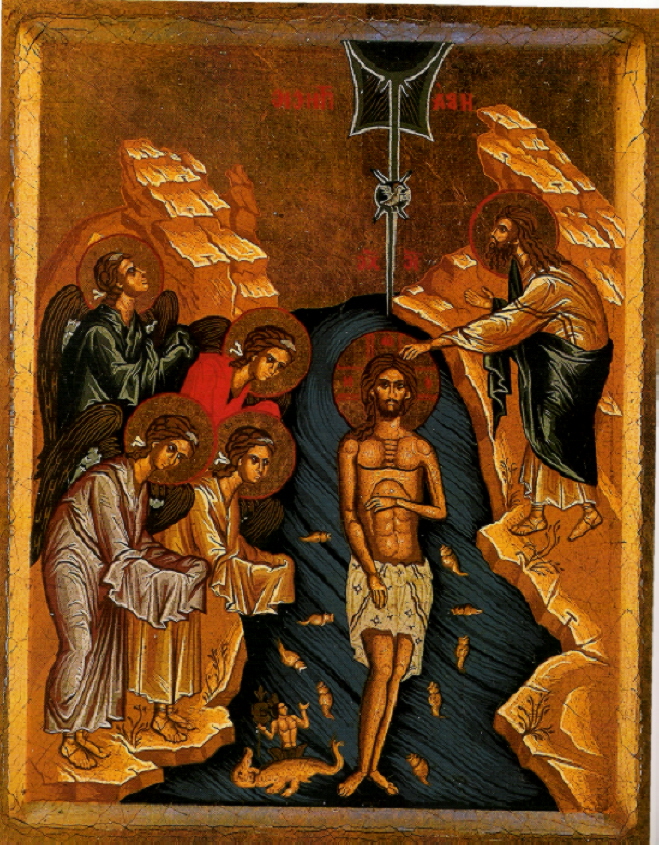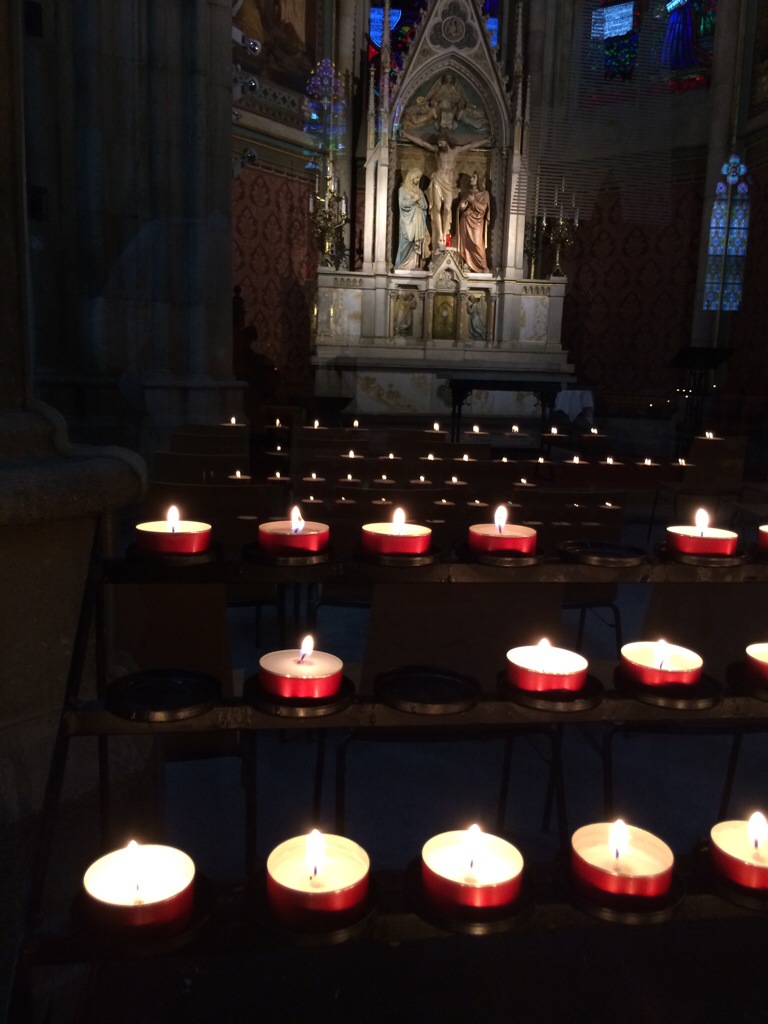This is my homily for this past Sunday evening service. I took a small liberty by introducing Luke’s account since Matthew’s is fairly sparse. The subject of this sermon came about by asking others what is the biggest question in their mind when they consider the infancy narratives. My wife and daughter and a few others online said that they wondered about Mary, her response, and why God had to be the Father. The latter question was more than an 8 minute homily could accommodate so I took a crack at the first.
Fourth Sunday of Advent (December 22, 2013)
Isaiah 7:10-16
Psalm 80:1-7, 17-19
[Romans 1:1-7]
Matthew 1:18-25
Mary, the Mother of Jesus –
How we respond makes all the difference in the world.
 This semester Izzy is taking AP Art History and on Monday I had the chance to speak to her class about the biblical passages behind certain famous themes found in art. Later that day Izzy asked me why Mary rose to such prominence in certain parts of the Church. It is a great question and whether she knew it or not, Izzy was acknowledging a curious fact about Mary; the Bible tells us very little about her. Another curious aside is that we know even less about Joseph.
This semester Izzy is taking AP Art History and on Monday I had the chance to speak to her class about the biblical passages behind certain famous themes found in art. Later that day Izzy asked me why Mary rose to such prominence in certain parts of the Church. It is a great question and whether she knew it or not, Izzy was acknowledging a curious fact about Mary; the Bible tells us very little about her. Another curious aside is that we know even less about Joseph.
We have, of course, a vast number of traditions about Mary that developed well after the Gospels were written, many even in the last 200 years, but the Gospels themselves are focused upon Jesus and so we have very few glimpses of his family. An answer to Izzy’s specific question will have to wait for another time, perhaps a Forum session, but tonight I want to focus upon Mary’s reaction to the news she received from Gabriel.
Our reading from Matthew presents us with Joseph’s reaction and it is commendable. Yet Mary had, in all senses of the phrase, the greater burden to bear. Luke’s gospel provides us with a fuller context.
Luke 1.30 The angel said to her, “Do not be afraid, Mary, for you have found favor with God. 31 And now, you will conceive in your womb and bear a son, and you will name him Jesus. … 34 Mary said to the angel, “How can this be, since I am a virgin?” 35 The angel said to her, “The Holy Spirit will come upon you, and the power of the Most High will overshadow you; therefore the child to be born will be holy; he will be called Son of God. 36 And now, your relative Elizabeth in her old age has also conceived a son; and this is the sixth month for her who was said to be barren. 37 For nothing will be impossible with God.” 38 Then Mary said, “Here am I, the servant of the Lord; let it be with me according to your word.” Then the angel departed from her.
Imagine the situation. You are all of 14 years old and the angel Gabriel appears to you. That alone would get me starting to think about therapy! And then the angel tells you that you are pregnant. I can imagine some of the conversation that the Gospel left out.
“Pregnant? I know that I am young, but I thought this required a man and a woman. Am I missing something?”
“Nope.” Says Gabe. “It was the Holy Spirit.”
“The Holy Spirit?” Asks Mary.
“Yup. You were made pregnant by God. Neat hunh?”
“Neat? You really think so? Tell me Gabe. Ever been pregnant yourself?”
“Well, no actually, I haven’t. I’m an angel, you see, and a boy one at that. We don’t go in for that sort of thing.”
Humorous yes and I am sure that Mary had some of those emotions and reactions. Any of us would. But the fact is, whatever her initial reactions, Mary responded in faith. She trusted that her God had things under control. And this is one, of many, great lessons that Mary has for us. How we respond to the challenges and hardships in life makes all the difference in the world.
Consider her cousin Elizabeth’s situation. Again, Luke provides us with the details. You will recall that Elizabeth gave birth to John who became known as the “Baptizer.” She was old, had been unable to have children. Her husband, Zechariah, was a priest and the Gospel of Luke opens with their story as Zechariah entered the sanctuary of the Lord to offer incense. The angel Gabriel appears to Zachariah as well and notice his response.
11 Then there appeared to him an angel of the Lord, standing at the right side of the altar of incense. 12 When Zechariah saw him, he was terrified; and fear overwhelmed him. 13 But the angel said to him, “Do not be afraid, Zechariah, for your prayer has been heard. Your wife Elizabeth will bear you a son, and you will name him John. 14 You will have joy and gladness, and many will rejoice at his birth, 15 for he will be great in the sight of the Lord. He must never drink wine or strong drink; even before his birth he will be filled with the Holy Spirit. 16 He will turn many of the people of Israel to the Lord their God. 17 With the spirit and power of Elijah he will go before him, to turn the hearts of parents to their children, and the disobedient to the wisdom of the righteous, to make ready a people prepared for the Lord.” 18 Zechariah said to the angel, “How will I know that this is so? For I am an old man, and my wife is getting on in years.” 19 The angel replied, “I am Gabriel. I stand in the presence of God, and I have been sent to speak to you and to bring you this good news. 20 But now, because you did not believe my words, which will be fulfilled in their time, you will become mute, unable to speak, until the day these things occur.”
My Elizabeth loved this story and would read it every Advent to our John. (She particularly liked the bit about the husband remaining mute until the birth of John.)
Remember, this is how Luke’s Gospel opens. We are told that once again God has heard a woman’s prayer for a child; 1The theme of barren women in the Bible is strong and well known. Here we have an older woman who was barren and wanted a child juxtaposed with a young woman who likely wasn’t expecting to be with child for a time, at least not until after her marriage was consummated! it took many years, but now an angel had come to declare the good news. But Zachariah did not believe and showed his skepticism by asking “How will I know that this is so?” When confronted with the angelic messenger all Zachariah can do is question the veracity of his statement and as a result Gabriel declares that he will remain mute until the child is born. This story is then quickly followed by Gabriel’s appearance to Mary and allows us to see with clearly Mary’s obedience, in stark contrast with Zach’s hesitancy.
Zechariah and Elizabeth had been married for many years and had been fervently praying for a child. Mary, on the other hand, was a child and only recently betrothed. Each finds out that “they” are pregnant and what are their reactions? The man who had been praying for a child, the man would not suffer any trauma or risk death in carrying and delivering a child is disbelieving. The young maid for whom there was no greater potential for disgrace than untimely pregnancy responds in obedience.
Notice too that they both ask “How.” Mary asks “How can this be?” Gabriel offers her an answer, explaining that she will conceive by the Holy Spirit. Zachariah’s “How” is of a different nature. He asks, “How will I know?” and Gabriel punishes him for his disbelief. He does not yet believe. Mary already believes and her question grows out of that belief. “OK. So I am going to be pregnant, but how since I am still a virgin?”
Perhaps it is the naiveté of a young girl and the jaundiced view of a professional cleric, but Mary is clearly our example of faith. Recall chapter 11 of Hebrews; “faith is the assurance of things hoped for, the conviction of things not seen” (Heb. 11.1). Mary was literally willing to give up her entire life for God. Everything was about to change for her.
But we all find times in our lives when we are faced with challenges that seem far beyond our ability to cope. And we all understand Zachariah as well. We want to know that it is all going to be all right. The reality is that in this life things will not always be “all right.” Mary’s little boy was born so that he might die for us.
But as my Elizabeth has said many times recently: none of us ask for these challenges, but it is up to us how we will respond to them. Mary provides us with the model to emulate. She teaches us how to respond with faith and obedience and perseverance.
I am too often like Zachariah (though rarely mute), but I should be more like Mary.
As we prepare to welcome Jesus again into our lives, how do we respond to the challenges he presents? Will he find us questioning the details or accepting his grace? Will he find “in us a mansion prepared for himself”?
Let us remain joyful, confident, and assured of our future, troubles and all, because through this child we have life eternal and even now as we toil in this life we have Emmanuel, God with us.
Amen.
- 1The theme of barren women in the Bible is strong and well known. Here we have an older woman who was barren and wanted a child juxtaposed with a young woman who likely wasn’t expecting to be with child for a time, at least not until after her marriage was consummated!






One thought on “Mary – How we respond makes all the difference”